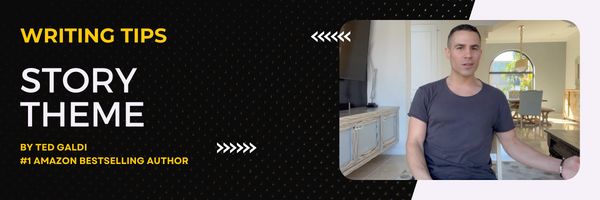Unlock the Power of Theme in Your StoryAre you writing a book, screenplay, or short story? Unlock the power of theme to give your characters and plot events a sense of focus, and to deliver a powerful emotional message by the end of your story. In this article, I'll provide the definition of a story theme, plus give you tips for building a great theme for your writing project. To write an awesome story, download my FREE outlining guide What is the theme of a story?The theme of a story is a commentary about the world that the story events make upon coming to a resolution. For example, in a crime story, if the criminal is captured at the end by a determined detective, the theme may be, "Perseverance leads to justice." Even though the events of a story are often focused on just a few characters and places, those events speak to the world in general. A story where a vicious criminal gets away with murder at the end is making a very different commentary about society than a story where a vicious criminal is arrested at the end. The story where the criminal gets away would be making a statement about the world being unjust, while the story where the criminal is captured would be making a statement about the world being just. How do you write a great story theme?How to choose a story themeYou should be mindful about the commentary on the world you'd like to make as a writer and choose a theme for your story early on. As you write, your theme can evolve, but having a solid starting point will help. Is there something unique you'd like to say about the world? Maybe you have an interesting take on a modern social sentiment. Or, maybe you have a new take on a psychological or philosophical concept that's been around for over a hundred years. You can build themes around these views. Something like "Perseverance leads to justice" is a viable theme, however, similar commentaries have been made by many crime stories. If you don't want to choose a theme that's totally unique, at least try to put a fresh twist on a common concept. For instance, your crime story can express the idea of "perseverance" in distinct way. In a typical crime story, the idea of perseverance is usually associated with a diligent cop doing what's right. However, in your story, maybe the cop breaks a lot of rules. He plants evidence. He coerces witnesses. He kills unarmed opponents. He definitely exhibits perseverance, but in a unique way. The relationship between theme and genreCertain genres often have stories with similar thematic elements. For example, crime stories often involve justice in their themes, while love stories often involve marriage. That being said, your genre should in no way limit your theme. Though a detective story's plot may focus on bringing a killer to justice, the relationship between the protagonist and his estranged wife could be the main thematic source - this story could have a theme about love despite being in the crime genre. That being said, even if your theme is unique to your genre, you still want your story to fit within the genre, as a whole. Your characters, plot events, and settings should stay true to your genre. You're encouraged to put unique twists on characters, plot events, and settings, but not to such a degree that you lose touch with the genre you're writing in. Even if your story works, audiences may feel deceived. If you choose a theme that forces you to drastically deviate from your genre, you should reevaluate. Either pick a new theme that's manageable within your genre, or choose a new genre that's a better fit for your theme. Your protagonist's want and need play a key part in your story themeYour main character should have a want - an external goal he pursues - and a need - an internal personal problem he should address to lead a better life. Your story's two most impactful threads are the ones that follow your main character's want and need. Thus, they carry a lot of weight with your theme. By the end of your story, if your hero achieves the want and/or need vs. doesn't achieve the want and/or need, the commentary the story is making could be drastically different. Let's say your main character has a want to win a big boxing match. Through the story, he trains really hard. If he wins the match at the end, your theme may be something like, "Hard work can lead to success." However, if your character loses the match at the end, your theme would instead be something like, "Despite hard work, success is never guaranteed." All characters and plot should revolve around your themeThough your protagonist plays a key role in the unfolding of your theme, all characters and plot events should be focused around this theme. For example, if you wanted to make a commentary about corruption, you may want to develop a character in your story who takes a bribe. The plot could then get into the consequences the character suffers after taking the bribe. If, instead, you wanted to make a commentary about family dynamics, your story may not call for a character who takes a bribe. In this case, you might want to include a character who's the protagonist's ex-convict uncle. Your story should have just one themeWhen creating your theme, focus is critical. As mentioned, all the character and plot development of your story should revolve around your theme. If you try to make multiple commentaries about the world in one story, its events may feel unconnected. Your story would have more force if you kept the events concentrated, all working in conjunction to declare a singular message about the world. Express your theme indirectlyYour audience should be able to infer your story theme by seeing how your plot concludes. You should avoid directly stating your theme to your audience, ex by having a character say it to another in dialogue. Allowing the audience to understand the theme on their own makes for a more engaging experience. A great way to draw attention to your theme without directly stating it is via the literary device motifs. These are recurring story elements associated with a component of your theme. Some examples are places, objects, and sounds. When the audience sees motifs repeating, they should assign importance to them and the underlying thematic components they represent. For example, let's say your theme is about regret, and a certain abandoned building in the story represents a bad business mistake your hero made. By featuring this building in multiple scenes, and showing the different negative emotions it provokes in your protagonist, the idea of regret becomes pronounced in the minds of your audience. At the end, possibly the building burns down, conveying the idea that the protagonist is finally able to move beyond his regrets. Want more writing tips?Download my FREE outlining guide:
0 Comments
Leave a Reply. |


 RSS Feed
RSS Feed